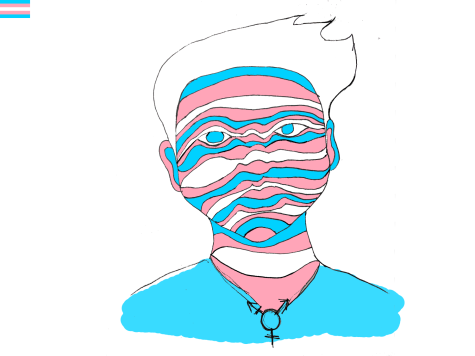Addressing transphobia at Whitman
December 2, 2021
Transphobia, defined as violence or negativity aimed at transgender or gender nonconforming people, is prevalent around the world.
“It’s unfortunate that it’s been 50 plus years since the Stonewall Riots. It is very ironic how it’s the same situation, the same disease that’s still going on,” said Joela Rivera, transgender community leader and organizer.
There are laws in place in the United States that seek to further oppress transgender people, particularly those who are Black or people of color. These laws include criminalization of healthcare, prevention of access to restrooms and other public spaces, restrictions on participation in schools, the workforce and more.
As socially conscious as we believe we are here at Whitman, we need to recognize the limitations of our education.
Why are professors failing to teach us about transgender existence? Why aren’t students taking the time to educate ourselves? Transphobia spreads rapidly at Whitman; ranging from a lack of access to safe bathrooms and living spaces, absence of resources, daily transphobic comments from students and faculty and much more. How can Whitman prevent transphobia if we fail to recognize and respect transgender existence?
Although it’s important to have a safe space for women in Prentiss, where are we creating safe spaces for transgender men? Even if we create all women spaces, how can trans women feel safe around uneducated cis women? How can we expect transgender and gender non-conforming people to feel safe in cisgender spaces if Whitman refuses to address transphobia?
Why was Whitman so quiet during transgender awareness week? Cisgender Whitties, were we even aware that Transgender Day of Remembrance was Nov. 20?
If we care at all for the Whitman community, we need to start acting like it. All cisgender people need to be educating ourselves to be better.

The transgender community has always lived with us and has always fought for our lives. Cisgender women and cisgender queer people have the trans community to thank for our rights, but where are we now? The silence from cisgender people about the violence that transgender and gender nonconforming people face speaks volumes about the transphobia we hold after they have repeatedly put their lives on the line for us.
There are myriad resources available for us to educate ourselves, such as the Transgender Law Center, GLAAD, Trans Women of Color Collective, Trans People of Color Coalition or documentaries such as The Death and Life of Marsha P. Johnson, Disclosure, and Still Black: A Portrait of Black Transmen.
There are organizations, such as the Black Trans Task Force, which provides resources to Black transgender people in Seattle and Tacoma. We can also donate to people’s GoFundMe’s, such as one for activist Joela Rivera, who needs vital resources for her survival.
Whitman is not subtle about the deeply rooted transphobia within the institution, and it is up to every cisgender Whitman community member to change that. Every single one of us needs to be educating ourselves and each other. We need to find ways to distribute resources to transgender people that we gain through our cisgender privileges. We cannot sit here and claim that we love our Whitman community if we are actively erasing and silencing the existence of our transgender peers.





anonymous • Dec 3, 2021 at 1:03 pm
I appreciate the author’s desire to draw attention to the issue of transphobia. However, this column contained inaccuracies. It asks, “Why was Whitman so quiet during transgender awareness week?” The Nov. 17 edition of the “Whitman Today” newsletter contained a thoughtful reflection on the Transgender Day of Remembrance by Dr. John Johnson, VP of Diversity and Inclusion (https://www.whitman.edu/campus-life/diversity/dei-updates/november-17-2021-transgender-remembrance-day). You could argue that people could do more at the institution, but it is important to acknowledge the efforts that those at the college are making.
Along these lines, the author asks: “Why are professors failing to teach us about transgender existence?” I would encourage students interested in learning about issues related to transgender identity, history, and experiences to take some classes in gender studies or classes that count toward the gender studies program. Additionally, Whitman does provide a map of gender-inclusive bathrooms on campus (https://www.whitman.edu/campus-life/diversity/intercultural-center/lgbtqia/gender-inclusive-bathrooms). These resources might be insufficient on their own, but in order to have a clear picture of the problem, there should be an accurate picture of where we are now.
A trans man • Dec 2, 2021 at 12:13 pm
While it is important that cisgendered individuals acknowledge their inherent privilege, it’s a reach to name Whitman as inherently transphobic. The institution may have not acknowledged transgender awareness week, but they also fail to acknowledge every other awareness week for other issues ranging from sexual assault to mental health. This issue is not limited to the trans community and therefore must not be isolated like this. Additionally, assuming that all faculty and students make daily transphobic comments only create a victim-like appearance for us, creating an us vs them rhetoric. There does need to be more discussion on marginalized groups, but this article is not it.
Another trans man • Dec 11, 2021 at 5:07 pm
1. just because they fail to address everything else does not take away from the fact that they fail to address transphobia 2. each issue can be spoken about individually even if they are interconnected 3. trans people are victims of transphobia and that is a fact. I’m glad to hear YOU do not experience it daily but maybe you should check your privilege as a trans MAN because trans women are the ones that deal with it most and I can even tell you right now as another trans man I have experienced it constantly here. Your experience is your own but you cannot speak for the whole community especially given that you’re a trans man. I agree with this article. Transphobia is deeply rooted in our society so of course it is deeply rooted in this school.